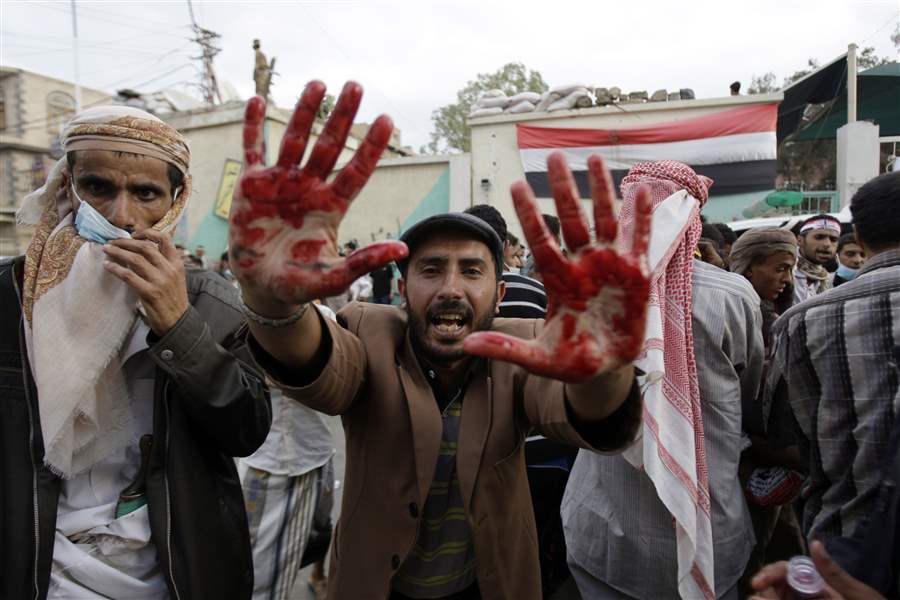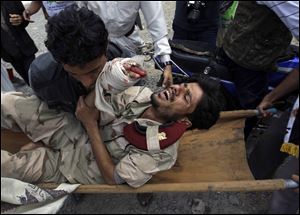
Yemeni soldiers, protesters battle in capital for 2nd day
Deaths rise past 50 as anti-Saleh violence escalates
9/20/2011
An anti-government protester holds out his blood-stained hands after clashes with security forces, in Sanaa, Yemen. Violence broke out as negotiations were intensifying on a possible political settlement.
associated press

Anti-government fighters carry a wounded defector soldier from the site of clashes with security forces in Sanaa, Yemen. About 1,000 people, mostly unarmed demonstrators, were reported injured in 2 days of violence.
SANAA, Yemen — Deadly violence convulsed the streets of Yemen’s capital for a second day Monday as government security forces battled soldiers who have joined anti-government protesters in their seven-month movement to force President Ali Abdullah Saleh to resign.
Taken together, the two days constituted the worst violence in the capital since the beginning of the uprising in Yemen, the Arab world’s most impoverished country and a haven for Islamic militants.
Medical officials in the capital said at least 28 people were killed Monday, pushing the death toll from two days of fighting in Sanaa to more than 50 — most of them unarmed protesters caught in the shooting — and raising fears that the escalation of deadly mayhem is hurtling Yemen toward a civil war. About 1,000 people, mostly demonstrators, were reported injured.
In another ominous sign of unraveling, officials closed Sanaa’s airport for a few hours Monday night, one of the few times that has happened since the uprising began in February. There were conflicting reports of a cease-fire late Monday night.
Mr. Saleh, a 69-year-old autocrat and U.S. ally, has been recuperating in Saudi Arabia from an assassination attempt here more than three months ago. He has vowed to return to Yemen, despite his repeated pledges to step down in a negotiated transfer of power.
Although the United States has been working behind the scenes to find a political solution to ease Mr. Saleh out of office, it has been slow to publicly call for him to step down, in contrast to the U.S. position on some other repressive autocrats in the Arab world, most notably in Libya. The U.S. Embassy here issued a statement expressing regret over the casualties in Sanaa.
“In this tense situation, we call upon all parties to exercise restraint,” said the statement. “In particular, we call on the parties to refrain from actions that provoke further violence. We reject actions that undermine productive efforts under way to achieve a political resolution to the current crisis.”
The Associated Press reported that thousands of protesters backed by military defectors seized a base of the elite Republican Guards Monday.
The protesters, joined by soldiers from the renegade 1st Armored Division, stormed the base without firing a single shot, according to witnesses and security officials. Some carried sticks and rocks. They used sandbags to erect barricades to protect their comrades from the possibility of weapons fire from inside the base, but none came, and the Republican Guards eventually fled, leaving their weapons behind.

An anti-government protester holds out his blood-stained hands after clashes with security forces, in Sanaa, Yemen. Violence broke out as negotiations were intensifying on a possible political settlement.
“It was unbelievable,” said protester Ameen Ali Saleh of storming the base on the west side of the major al-Zubairy road, which runs through the heart of Sanaa. “We acted like it was us who had the weapons, not the soldiers.”
“Now the remainder of the regime will finally crumble,” said another demonstrator, Mohammed al-Wasaby. “Our will is more effective than weapons. The soldiers loyal to Saleh just ran away.”
To some extent, the new violence may be an outcome of a bitter, decades-old rivalry within Yemen’s political elite, one that has largely displaced the popular uprising. The rivalry pits the Saleh family — who still control most of the country’s important military and intelligence resources — against one of Yemen’s most powerful tribal clans, the Ahmars, and a defected army officer, Maj. Gen. Ali Mohsin al-Ahmar, who is no relation and whose soldiers have been protecting the protesters for months and clashing with government forces over the past two days.
The violence broke out just as negotiations were intensifying on a possible political settlement between the governing party and opposition leaders that would, theoretically at least, lead to an early presidential election and possibly bring a sense of stability to the country.
But those negotiations have been conducted without much input from either the Saleh or Ahmar clans or General al-Ahmar, who all have a vested interest in the outcome.
Jamal Benomar, a U.N. special envoy, and a delegation from the Gulf Cooperation Council, a regional group, arrived in Sanaa Monday in an effort to expedite the negotiations.
“Mediators were finalizing a power transfer plan that will prevent the dominance of both houses of Ahmars and Salehs,” said one Yemeni official, who spoke on condition of anonymity.
The protesters have opposed any settlement that would preserve much of Yemen’s status quo.
By Monday afternoon, the protest scene was a mixture of chaos and resolve. Motorcycles and ambulances carried mangled bodies away from the center of fighting, a major intersection just south of the site of anti-Saleh sit-ins. But protesters held their ground.